Vote climate in the Victorian election 2022
The Victorian Labor government has some strong climate policies, but they fall well short of the emergency action that is needed to preserve a livable planet. The best hope for emergency action is for small parties and independents with stronger policies to win the balance of power in both lower and upper houses.
For this reason, we have focussed on developing printable scorecards for the upper house and for the electorates where parties and independents with stronger policies are standing. See lower house scorecards for key seats below.
How to vote climate in the Legislative Council (upper house)
Victoria is the only state to retain the undemocratic 1 above the line upper house voting system where the party you vote for decides your preferences for you - Group Ticket Voting. It's a playground for preference whisperers and dodgy deals. Read more here.
Watch the full video of preference whisperer Glen Druery describing how he has worked with Labor and micro-parties to game the system and "keep the Greens at bay".
We think it's vital to consider the the past voting records and the preferencing of upper house parties as well as their climate policies. Read more about voting patterns of current MPs from our colleaugues at Vote Climate One here.
Below are our first five upper house scorecards - for the metropolitan regions. For more on how we've rated the parties, scroll on down below the scorecards.
We are recommending you vote 1 above the line for one of the four parties with strong climate policies and climate-friendly preferencing.
Fortunately, this election there are four parties with strong climate policies that also do climate-friendly preferencing - but only in the five metropolitan seats and only in the upper house.* There is some questionable preferencing from Reason and Animal Justice in country regions.**
These four parties are the Greens, Victorian Socialists, Reason and Animal Justice. In metropolitan regions, it's a more effective approach to vote 1 above the line for one of these four than to vote below the line. Voting 1 above the line for one of these four in metropolitan regions means that you are preferencing ALL the candidates of ALL the parties in order from best to worst and this will give you the best chance of influencing the all-important contest for the last seat in your region. If you vote below the line in the upper house and don't number all the candidates, there's a chance your ballot will be exausted before the contest for the last seat is decided as this can often be a contest between micro-parties and if you haven't expressed a preference for either of them, you will have no say over who wins.
* Reason has preferenced Labor above the Greens in the crucial lower house marginal Labor/Greens seat of Northcote.
** In Northern Victoria (country) region, Animal Justice and Reason preference Labor above Greens, Reason preferences Angry Victorians above the Greens(!) and Animal Justice also has Angry Victorians high on their group voting ticket, so you may want to stick with Greens or Victorian Socialists if voting 1 above the line in Northern Victoria. Legalise Cannabis also has Labor and Angry Victorians above Greens in this region. Angry Victorians preference Legalise Cannabis and Reason in Northern Metro where Reason are working hard to have Fiona Patten re-elected.
In Eastern Victoria (country) region, Animal Justice and Reason preference Labor above Greens and Angry Victorians high (but below Greens and Labor) so best to stick with Greens or Victorian Socialists here as well - if voting 1 above the line. Labor has Shooters, Fishers and Farmers above Greens in this region and Legalise Cannabis has Labor above Greens with Angry Victorians high on their ticket.
In Western Victoria (country) region, Reason has Angry Victorians above Greens and Labor and Animal Justice has Angry Victorians high on their ticket. Labor has Shooters, Fishers and Farmers above Greens and Labor, and Legalise Cannabis has Angry Victorians above Greens and Labor. Probably best to stick with Greens and Victorian Socialists if voting 1 above the line in this region.
If you prefer to vote below the line, you are required number a minimum of five candidates, but it is FAR more effective to number as many as possible - at least ALL the candidates from the top 12 parties, and preferably all the candidates from all the parties.
This means numbering dozens of candidates without making a mistake, so if you can find a party you are happy to vote for above the line, that's going to be a lot easier! If you are voting below the line, be sure to keep numbering till you really don't care which of the remaining parties wins the last spot. You can check the preferencing of your preferred party at Anthony Green's site: it's much easier to follow than the Victorian Electoral Commission.
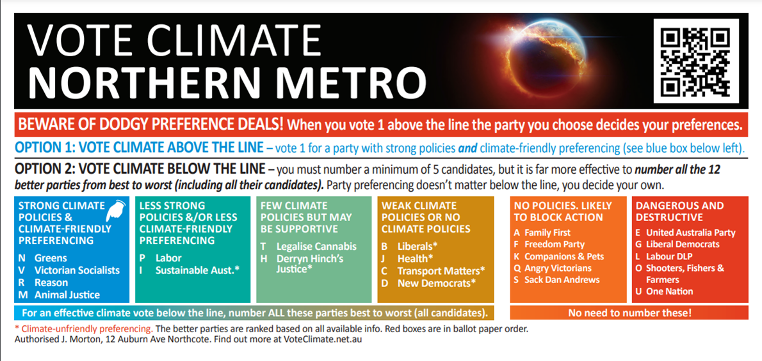
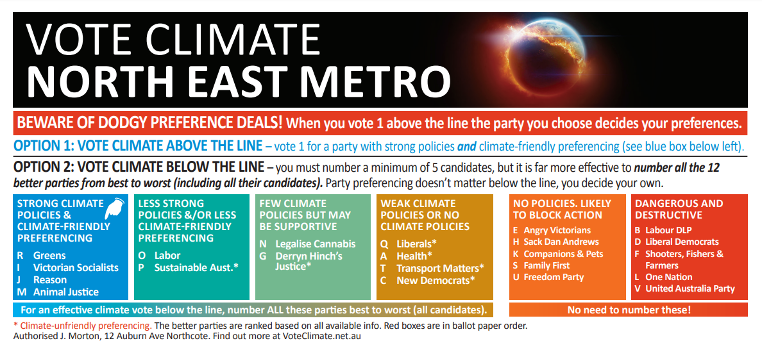
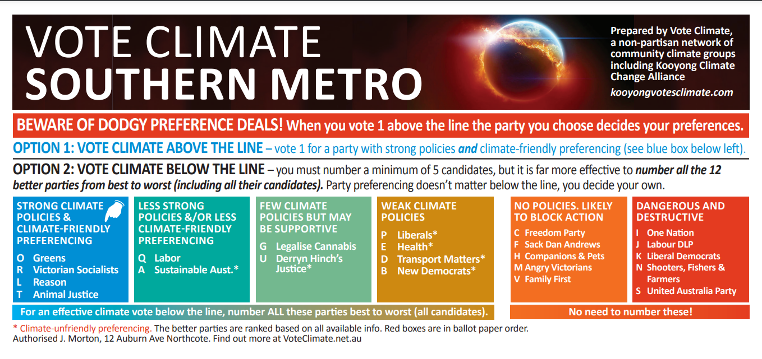
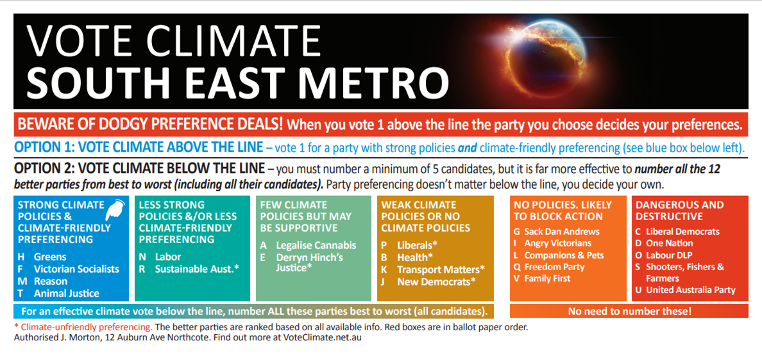
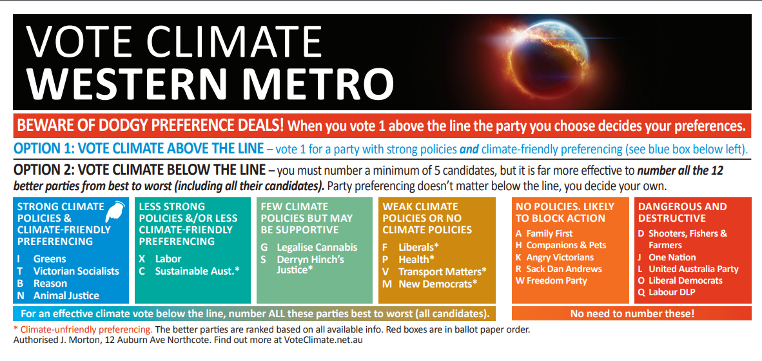
Parties with strong climate policies and mostly climate friendly preferencing
It's safe to vote 1 above the line for these - but only in the metropolitan regions. (See red note above.)
Greens
The Victorian Greens recognise that ‘human-induced climate change poses one of the greatest threats to our world in human history and requires urgent local, national and global action’. They moved to declare a climate emergency in 2019. They support a renewable electricity target of 100% by 2030, phasing out the use of coal for electricity generation by 2030, an emissions reduction target of 80% by 2030 and net zero by 2035 or sooner. They oppose all new fossil fuel projects and are calling for an immediate end to native forest logging. They are preferencing climate-friendly parties above the others and it is safe to vote 1 above the line for them in all regions.
Victorian Socialists
The Victorian Socialists are an anti-capitalist party. They recognise that we face a climate emergency and support the declaration of a climate emergency. They have strong climate policies, but climate action is not a central priority. They support emissions reductions of 75% below 2005 levels by 2030, and zero emissions by 2035 with a permanent net-negative emissions economy by 2040. They would prohibit the development of all new fossil fuel projects and exports. They support an immediate end to native forest logging. Their preferences flow to parties that are towards the left above parties from the right and this usually means that they preference climate-friendly parties above the others. Their preferencing this election is climate friendly in all regions.
Animal Justice
The Animal Justice Party recognises that we face a climate emergency, but their priorities are focussed on animal justice issues and this is sometimes reflected in their preferencing. Their representative in the Victorian upper house, Andy Meddick, has supported climate action, but has mainly used his position to advance animal welfare policies. However, he was one of only three MPs to vote against the lifting of the moratorium on exploration and extraction of conventional gas. He also negotiated some electric vehicles incentives. Animal Justice were part of the Glen Druery preference swap arrangement, but double-crossed him at the last minute. They have in the past done preference deals with climate-unfriendly parties to advance their central agenda. They preferenced Labor above the Greens in Victoria in the federal election 2022 in return for some commitments on live exports and national parks. Their preferencing this election is climate-friendly in all the metropolitan regions but not in country regions. Don't vote 1 above the line for Animal Justice Party in country regions.
Reason
Fiona Patten's Reason Party supports the call to declare a climate emergency. They support net zero emissions by 2030. Fiona Patten (perhaps reluctantly) supported the resumption of conventional gas exploration in Victoria stating that it was her understanding that the Labor government was 'over a barrel' because of threats by the federal Coalition government, that 'has insisted that this moratorium be lifted before they provide any further funding for Victoria to continue in our energy deals [to] reduce carbon emissions'. (See Hansard page 1917-1918). Reason supports an immediate end to native forest logging. Fiona Patten has used her position to advance issues such as safe injecting rooms. Reason have refused to be part of Glen Druery's preferencing arrangements and in the federal election their Victorian preferencing was mainly climate-friendly except for preferencing Labor above the Greens. However, they appear to have done some questionable deals in country regions (see above) and they are supporting Labor above the Greens in the crucial Labor/Greens marginal seat of Northcote. Don't vote 1 above the line for Reason in country regions.
Parties with some positive climate policies
Labor
The Australian Labor Party in Victoria acknowledges that strong action on climate is needed, but voted against the declaration of a climate emergency in 2019. However, they have recently taken some strong steps to reduce emissions. They are working towards a 45% - 50% reduction on 2005 emissions levels by 2030, a 75% - 80% reduction by 2035, and net zero by 2045. They are working towards 65% renewable energy by 2030, and 95% by 2035, with an end to coal-fired electricity generation. They will re-establish the State Electricity Commisions to build new publicly owned renewable energy projects. They banned fracking for gas, but lifted the moratorium on off-shore and on-shore conventional gas exploration and production and are considering approving an LNG gas import terminal. They plan to phase out all native forest harvesting by 2030 with some reductions in 2024. Their preferencing is climate friendly in all the regions checked so far, but we do not recommend voting 1 above the line for Labor as their policies are weaker than those of the four parties listed above.
Sustainable Australia Party – Stop Overdevelopment / Corruption
Sustainable Australia support policies aimied at staying under +1.5C. They have a of target net zero emissions before 2050, with a preferred target of net zero emissions by 2035 - and at least 50% emissions reductions by 2030. They support phasing out fossil fuel subsidies. They have a major focus on stabilising population. Their policies on coal and gas are not particularly strong - a ban on new coal mines and a gas reservation policy. However, Clifford Hayes from Sustainable Australia was one of only three upper house MPs to oppose the lifting of the Victorian moratorium on conventional gas exploration and extraction. He also instigated an attempt to include climate considerations in the Planning Act. The party did not allocate preferences in the federal election, but they have regularly been part of dubious preference swap arrangements in the past in Victoria, directing preference to the LIberal Democrats and other small parties that attempt to block action on the climate emergency. For this reason we rank them below Labor despite their advocacy for stronger emissions reduction targets than Labor. This election, they are preferencing the LIberal ahead of Labor and the Greens and parties like the LIberal Democrats and the DLP ahead of Reason and the Greens. Definitely do not vote 1 above this line for this party!
A party with few or no climate policies that may support strong action on climate and has someclimate-friendly preferencing
Legalise Cannabis Victoria
This party has some vague policies around hemp and recognises the need for some environment protection measures. Their preferencing in Victoria at the 2022 federal election was climate friendly and the same this election. They are preferencing the four parties in our top recommended box - and Labor - ahead of all the rest. If you vote 1 above the line for this party in metropolitan regions your preferences will flow to parties favouring strong acton on the climate emergency. But why not vote for a party with strong climate policies? In country regions, some of their preferencing is problematic.
Parties with few or no climate policies, that may support some climate action, but are preferencing climate blockers - definitely don't vote 1 above the line for these!
Derryn Hinch’s Justice Party
This party's main focus is on justice and integrity issues. They have no climate or energy policies. However, they nearly always vote with the Labor Party on environment and energy, including for Labor's emissions targets and renewable energy initiatives. They also voted with Labor to lift the moratorium on conventional gas projects. In the 2018 election, they won three upper house seats by working with preference whisperer Glen Druery and cross-preferencing climate action opponents like the Liberal Democrats. This election, they are once again putting the Liberal Democrats and the DLP ahead of all the parties with the strongest climate policies.
Parties supporting weak action on climate. Definitely don't vote above the line for any of these.
If you are voting below the line, it is worth preferencing all the better parties, but also the parties in this box. The final seat in each region may come down to a choice between one of these and the even worse climate blockers in the red box further down, so it's worth making your preference for all the 'less worse' options clear.
Liberal Party of Victoria
The Liberals have relentlessly opposed climate action in Victoria, but have recently had a change of heart and now support a legislated 50% emissions reduction by 2030 and net zero by 2050. This is a big improvement on their previous position. They support conventional on-shore gas exploration and production, with new fields being reserved for domestic use. They are preferencing smaller parties blocking action on the climate emergency.
National Party of Australia (not standing in metropolitan regions)
The Nationals, like their coalition partners have done an abrupt policy U-turn and now favor zero emissions by 2050 and renewable energy. Also a considerable improvement. However, they still support fossil fuel projects and no end date for logging of native forests. They preference parties blocking climate action.
Health Party
This party has a few low-key but positive climate policies. They have been part of the Glen Druery preference swap deal in the past. They are preferencing a range of micro-parties (good and bad) before all the major parties.
Transport Matters Party
This party has a few low-key but positive climate policies. They have been part of the Glen Druery preference swap deal in the past and this election they are preferencing the LIberal Democrats and the DLP ahead of parties with strong climate policies.
New Democrats
The New Democrats is a minor party registered just 51 days before the election. It was formed by former Western Region Labor upper house member, Kaushaliya Vaghela. They have no website and no published policies. How will they vote if elected? Given their founder was a Labor Party member, they may be inclined towards supporting Labor's climate policies. On the other hand, Adem Somyurek, a factional colleague, has left Labor and is standing for Labour - DLP which is a right-wing party with destructive climate policies. Their preferences flow in a variety of directions in the various regions.
From Wikipedia: On 9 February 2022, Vaghela crossed the floor in support of Adem Somyurek's motion to refer the government to the Victorian Ombudsman in relation to the alleged misuse of taxpayer funds, involving the diversion of parliamentary staffing resources to political campaigning and party factional activities prior to the 2014 Victorian state election. In March 2022, Vaghela resigned from the ALP, making serious allegations of bullying against the party. Her criticisms were aired after she had been left off the Labor ticket for the 2022 state election, following an investigation by the Independent Broad-based Anti-corruption Commission (IBAC) into the conduct of her husband and staff members.
Parties with dangerous and destructive climate policies or no climate policies.
They ALL use climate-unfriendly preferencing
Angry Victorians Party - no climate policies. Did an expose on Glen Druery's preference whispering techniques.
Companions and Pets Party - no climate policies
Democratic Labour Party - dangerous and destructive climate policies
Family First - dangerous and destructive policies
Freedom Party of Victoria - no climate policiesLabour DLP - dangerous and destructive climate policies
Liberal Democratic Party - dangerous and destructive climate policies
Pauline Hanson’s One Nation - dangerous and destructive climate policies
Restore Democracy: Sack Dan Andrews - no climate policies. Glen Druery says he created this party.
Shooters, Fishers and Farmers Party - dangerous and destructive climate policies
United Australia Party - dangerous and destructive climate policies
Here's how to vote climate in the Legislative Assembly (lower house)
Below are some printable scorecards from local groups for key seats.
Ashwood:
Click here to go to a scorecard for the Legislative Assembly seat of Ashwood prepared by the Victorian Climate Action Network Scorecard Working Group in conjunction with local climate groups, Lighter Footprints and Ashwood CAN.
Hawthorn
Click here to go to a scorecard for the Legislative Assembly seat of Hawthorn created by local climate groups, Lighter Footprints and Kooyong Votes Climate.
Kew
Click here to go to a scorecard for the Legislative Assembly seat of Kew created by local climate groups Lighter Footprints and Kooyong Votes Climate.
Malvern
Click here to go to a scorecard for the Legislative Assembly seat of Kew created by local climate groups, Lighter Footprints and Higgins Climate Action Now.
Northcote
Click here to go to a scorecard for the Legislative Assembly seat of Northcote created by Vote Climate.
Richmond
Click here to go to a scorecard for the Legislative Assembly seat of Richmond created by local climate group, Yarra Climate Action Now.
All other lower house seats
Our friends at Vote Climate One have guides that include all candidates in all Victorian seats.